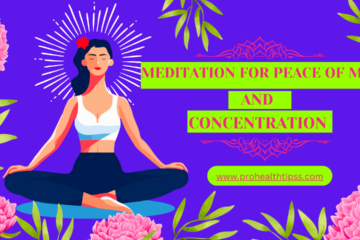Meditation Tips: How does help,7 Tips,Would Meditation Treat for Anxiety and Depression
Meditation serves as a potent tool for effectively managing Meditation Tips for Anxiety and Depression, providing a pathway towards achieving inner tranquility and emotional well-being. To begin, it is important to locate a serene and comfortable space that is free from distractions. Commence your practice by directing your attention to your breath, utilizing it as an anchor to ground yourself in the present moment. Over time, gradually extend the duration of your meditation sessions and explore various techniques such as guided meditations or body scans, to identify the ones that resonate with you the most. Through regularity and perseverance, meditation can emerge as a valuable companion on your journey to conquer anxiety and depression.

Here are some help to manage Meditation Tips for Anxiety and Depression:
- Find a peaceful space: Choose a quiet and comfortable location where you can meditate without disturbances. This could be a dedicated room, a corner of your home, or even a serene outdoor spot.
- Set aside dedicated time: Schedule regular meditation sessions in your daily routine. Start with shorter durations, such as 5-10 minutes, and gradually increase the length as you become more comfortable.
- Focus on your breath: Begin by bringing your attention to your breath. Observe the sensation of each inhale and exhale, letting your breath become an anchor to the present moment. If your mind wanders, gently guide it back to your breath.
- Practice mindfulness: Embrace a non-judgmental awareness of your thoughts, emotions, and bodily sensations. Instead of getting caught up in them, observe them with curiosity and acceptance. This helps cultivate a sense of detachment and reduces their power over you.
- Explore guided meditations: Utilize guided meditation apps, recordings, or online resources tailored specifically for anxiety and depression. These can provide structure and guidance during your practice, offering techniques to calm the mind and soothe emotional distress.
- Incorporate body scans: Engage in body scan meditations, where you progressively focus on different parts of your body, paying attention to any tension or discomfort. This technique promotes relaxation and helps you connect with your body.
- Cultivate self-compassion: Be kind and gentle with yourself during meditation. Recognize that it’s natural for the mind to wander, and don’t criticize yourself for it. Treat yourself with compassion, understanding that meditation is a practice that evolves over time.
- Seek professional guidance: If you’re dealing with severe anxiety or depression, consider seeking guidance from a qualified meditation teacher or therapist. They can offer personalized techniques and support to complement your meditation practice.
7 Meditation Tips for Anxiety and Depression
- Start with short sessions: Begin with shorter meditation sessions, around 5-10 minutes, and gradually increase the duration as you become more comfortable. Consistency is more important than the length of each session.
- Focus on the present moment: Anxiety often arises from worrying about the future, while depression can be tied to dwelling on the past. Use mindfulness techniques to anchor your attention to the present moment, such as focusing on your breath or the sensations in your body.
- Practice self-compassion: Be gentle and kind to yourself during meditation. If your mind wanders or you experience difficulty, don’t judge or criticize yourself. Instead, offer understanding and self-compassion, treating yourself with the same care you would give to a loved one.
- Use guided meditations: Guided meditations can be helpful for anxiety and depression, as they provide structured instructions and soothing guidance. Look for guided meditations specifically designed to address anxiety and depression, available through apps, websites, or meditation platforms.
- Incorporate relaxation techniques: Combine relaxation techniques with meditation to further alleviate anxiety and depression. Progressive muscle relaxation, deep breathing exercises, or visualizations can help relax your body and mind, enhancing the overall meditation experience.
- Establish a consistent routine: Set aside dedicated time each day for your meditation practice. Creating a routine helps train your mind and body to relax and be present, and it provides a reliable anchor amidst the uncertainties of anxiety and depression.
- Seek professional support: While meditation can be a powerful tool, it’s essential to seek professional help for managing anxiety and depression. Consider working with a therapist or counselor who can guide you through specific meditation techniques tailored to your needs, alongside other therapeutic interventions.

Would Meditation Treat Anxiety and Depression
Meditation has been recognized as a potential method for managing anxiety and depression. While it may not be a cure-all, numerous studies and anecdotal evidence suggest that regular meditation practice can have positive effects on reducing symptoms of anxiety and depression.
Meditation offers several benefits that can help with anxiety and depression. Firstly, it promotes relaxation by calming the mind and soothing the nervous system. This relaxation response can counteract the physiological and psychological symptoms associated with anxiety and depression, such as racing thoughts, restlessness, and low mood.
Moreover, meditation cultivates mindfulness, which involves non-judgmental awareness of the present moment. By practicing mindfulness, individuals can develop a better understanding and acceptance of their thoughts and emotions, reducing the impact of negative thinking patterns and enhancing emotional resilience.

How does Meditation help Anxiety and Depression?
- Relaxation response: Meditation activates the body’s relaxation response, which counteracts the physiological effects of anxiety and depression. It reduces heart rate, blood pressure, and the production of stress hormones, promoting a state of deep relaxation and calm.
- Mindfulness and emotional regulation: Meditation cultivates mindfulness, the non-judgmental awareness of the present moment. This practice allows individuals to observe their thoughts and emotions without getting entangled in them. By developing mindfulness, one can better regulate their emotions, reducing the intensity and reactivity associated with anxiety and depression.
- Stress reduction: Chronic stress exacerbates anxiety and depression. Meditation helps manage stress by calming the mind and promoting a sense of inner peace. Regular practice can lead to a decrease in overall stress levels, making individuals more resilient in the face of anxiety-provoking or depressive situations.
- Cognitive restructuring: Anxiety and depression often involve negative thought patterns and distorted thinking. Through meditation, individuals can become more aware of these patterns and learn to challenge and reframe negative thoughts. This cognitive restructuring can lead to a more balanced and positive mindset.
- Self-awareness and introspection: Meditation encourages self-reflection and self-awareness. It allows individuals to explore their inner experiences, gain insight into the root causes of their anxiety or depression, and develop a deeper understanding of themselves. This self-awareness is a crucial step towards making positive changes and fostering personal growth.
- Neuroplasticity and brain changes: Research suggests that long-term meditation practice can bring about positive changes in the brain. It is associated with increased gray matter density in brain regions related to emotional regulation, attention, and self-awareness. These structural changes may contribute to improved emotional well-being and resilience.
- Enhanced overall well-being: Regular meditation practice promotes a sense of overall well-being by improving sleep quality, increasing self-compassion, and fostering a positive outlook. It can also improve concentration and focus, helping individuals better manage the cognitive challenges often associated with anxiety and depression.
Meditation and Relaxation Music
SUGGESION
Some practical suggestions for incorporating Meditation Tips for Anxiety and Depression:
- Start small and be consistent: Begin with shorter meditation sessions, such as 5-10 minutes, and gradually increase the duration as you feel more comfortable. Aim for consistency by setting aside dedicated time each day for your meditation practice.
- Find a peaceful space: Choose a quiet and comfortable space where you can meditate without distractions. Create a soothing environment by dimming the lights, using candles or soft music, and making sure you won’t be interrupted.
- Focus on your breath: Use your breath as an anchor during meditation. Close your eyes, take deep breaths, and pay attention to the sensation of the breath entering and leaving your body. Whenever your mind starts to wander, gently bring your focus back to your breath.
- Embrace mindfulness: Practice non-judgmental awareness of your thoughts, feelings, and bodily sensations. Allow them to come and go without getting caught up in them. Cultivate a sense of curiosity and acceptance, observing your inner experiences with kindness and understanding.
- Explore guided meditations: Utilize guided meditation resources specifically designed for anxiety and depression. These can provide step-by-step instructions, affirmations, and soothing guidance to help you relax and navigate challenging emotions.
- Incorporate meditation into daily activities: Extend the benefits of meditation beyond your formal practice. Practice mindfulness while doing everyday tasks, such as walking, eating, or washing dishes. Pay attention to the present moment, engaging your senses fully.
- Seek support and guidance: Consider joining a meditation group or seeking guidance from a meditation teacher or therapist experienced in anxiety and depression. They can provide personalized tips, answer questions, and offer support throughout your meditation journey.
- Be patient and compassionate: Understand that meditation is a practice that takes time and patience. Be kind to yourself and don’t judge your progress. Treat yourself with compassion and celebrate even the smallest steps forward.
CONCLUSION
Meditation offers a powerful and accessible approach to Meditation Tips for Anxiety and depression. By incorporating these meditation tips into your daily routine, you can cultivate a greater sense of inner peace, emotional well-being, and resilience. Through focused attention, mindfulness, and self-compassion, meditation helps alleviate stress, regulate emotions, and reframe negative thought patterns. It empowers you to develop a deeper understanding of yourself, build self-awareness, and make positive changes in your life. Remember to approach meditation with consistency, patience, and an open mind, allowing its benefits to unfold gradually.
If you know more about must read this article Can Meditation Cure Overthinking Click Here
Thank You



